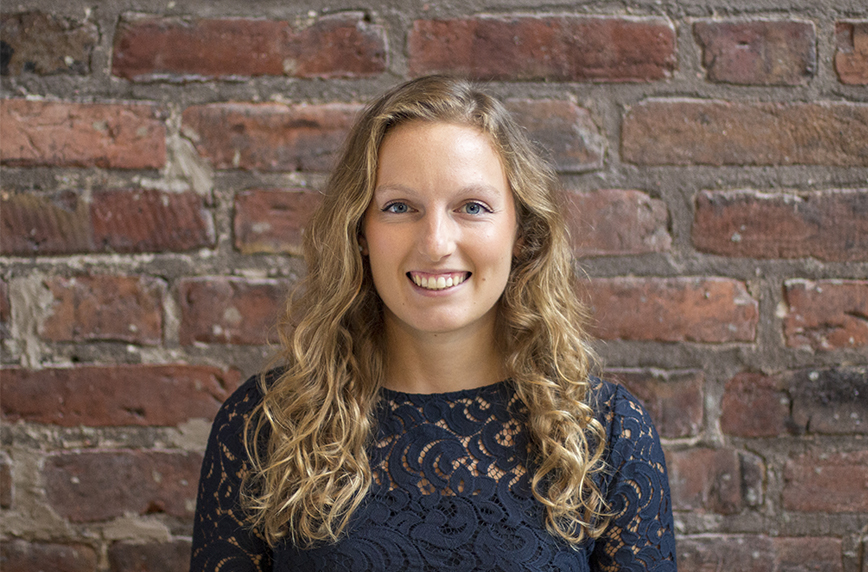I would describe my time at KTH as being full of opportunities for both academic and personal growth
Katlin comes from Toronto, Canada. Before moving to Sweden, she studied Engineering Science and Biomedical Systems at the University of Toronto, and she worked at a medical device company developing tools for neurosurgery.

Why did you choose this master’s programme at KTH?
KTH is a strong technical university with an international reputation and provides a master’s programme that is specific enough to really learn about and tackle interesting healthcare problems. I also wanted to see the clinical side of medical engineering, and the connections between KTH and Karolinska Hospital provide opportunities for that.
You also received the KTH Scholarship, what has it meant for you and your studies?
The KTH Scholarship is what enabled me to accept the offer and come to KTH. It made it financially possible for me to move to Sweden, and I’m so grateful for this opportunity. Studying at KTH has allowed me to learn about different ways of approaching medical innovation, and about an entirely new healthcare system. These new perspectives are extremely valuable to me and my future career and are something I could only get by studying in this environment.
What was your academic or professional background before applying for the KTH scholarship?
Before coming to KTH, I studied Engineering Science at the University of Toronto, where I specialized in biomedical systems engineering. This was an advanced and interdisciplinary engineering programme, and also included a 1-year internship. After completing these studies, I worked as an engineer at a medical technology company in Toronto that developed tools for neurosurgery. I enjoyed this experience so much that I wanted to continue my education in this field, which is what led me to Medical Engineering at KTH.
Do you have any recommendations for future students applying for the KTH scholarship?
My advice is to give yourself a lot of time to work on your application - I worked on mine over many weeks! It takes time to think about and fully understand your motivations and curiosity about studying at KTH, and then more time to figure out how to put that into words! It’s helpful to discuss your reasons with friends, colleagues and mentors to get feedback on how clearly you can articulate these things about yourself.
What are the best aspects of your programme?
I really appreciate how flexible the curriculum is when it comes to course selection. In the Medical Engineering programme, you can choose what really interests you, and there is plenty of room to explore new interests. For example, I was able to take a course in interaction design and accessibility, which taught me valuable skills to apply when I design medical devices.
Have you chosen a specialisation track within the programme? If Yes, which track and why?
I chose the electronics track because I’m interested in designing medical devices in my future career, and the courses in this track seem to fit that interest best for me.
What are your favourite courses thus far?
The most valuable course I’ve taken thus far is Technology in Surgery, Anesthesia and Intensive Care. In this course we participated in a series of guest lectures from experts in the field (nurses, doctors, surgeons, hospital directors) and through this, discovered and tried to solve a problem from the field in a course project. Being able to hear from and ask questions to experts in health care was such an enriching experience.
I also really enjoyed a course I took about interaction design and accessibility, and I got to try something outside my comfort zone when I took a course in innovation management.
How do studies at KTH differ from your previous studies?
The biggest difference for me is the structure of the semester. Previously, I’d take five to six courses at a time over an entire semester, but the system of having shorter periods and only two to three courses at a time at KTH really allows you to dive fully into a subject. I like this system more because it seems like it prepares you for what it’s like to work in a company when you dedicate almost all of your work time to only a few projects.
How is student life in Stockholm?
I think there is a vibrant student community, both at KTH and in Stockholm. When I first arrived in Sweden, I joined the Outdoor Club at KTH and was immediately immersed in adventure activities and met students from all over the world who shared my passion for the outdoors. The International Reception is also a huge event to welcome new students to KTH and provided me with so many opportunities to make friends and feel connected to the student life as soon as I arrived.
How would you describe your time at KTH so far?
I would describe my time at KTH as being full of opportunities for both academic and personal growth. Moving to another country was something that I have always wanted to do and pursuing my master’s at KTH has been a great way to do that. I feel so lucky to be here!
What do you want to do after graduating?
My career goals are to work as a product manager at a medical device company, which to me means being in a leadership position that connects clinical problems to engineering teams that can solve them. I hope to have this type of role within the field of surgical devices or surgical robotics.
What would you like to say to students thinking of choosing KTH for their master’s studies?
I would say that KTH will provide you with a great amount of independence and freedom to explore – this is a unique opportunity to take charge of your education and make the most of it. I also want to say that the Swedish summer sunlight is magical – you should plan to be here to enjoy it!

